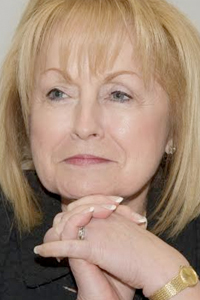
Madeleine Meilleur
Lifetime Contribution
During a career dedicated to public service, Madeleine Meilleur has exercised dynamic and unifying leadership, constantly involving the collaboration of all the milieus, communities and stakeholders with whom she has had to address challenges at the time. Her political action has been characterized by rigorous and highly collaborative work, focused on improving public services. Her commitment to Franco-Ontarians was manifested not only by her active presence in community circles, but also by her significant influence on numerous provincial government policies and by tangible advances positively influencing the future of the Franco-Ontarian community.
Madeleine Meilleur is a registered nurse and lawyer specializing in labor and employment law. Before entering politics at the provincial level in 2003, Ms. Meilleur had first worked at the municipal level in 2000 as Municipal Councillor for the newly amalgamated City of Ottawa. Previously, she had been Councillor of the regional municipality of Ottawa-Carleton, as well as municipal Councillor of the City of Vanier, Ontario. As a city Councillor, she led, with her fellow French-speaking councillors, the adoption of the bilingualism policy in the city of Ottawa.
Madeleine Meilleur was first elected to the Ontario Legislative Assembly in 2003 as the Member of Parliament for Ottawa-Vanier. She was then re-elected in 2007, 2011 and 2014. She held several ministerial portfolios within the Government of Ontario including that of the Attorney General, Community Safety and Correctional Services, Community and Social Services, Culture, and for twelve years, that of Minister for Francophone Affairs.
As Attorney General, Ms. Meilleur created a legal aid program for victims of sexual assault. She also established a round table on justice bringing together various stakeholders (judges, lawyers, police, doctors, etc.) that aimed to find innovative solutions to complex legal problems. Among other things, these efforts have targeted people with mental health issues in the justice system. Under her leadership, Ontario has raised the legal aid eligibility threshold by 6 percent. It also oversaw the creation of a new Division within the Department of Aboriginal Justice. Strongly committed to Ontario’s Francophonie, she has improved legal services in French through a pilot project that aims to further facilitate the active offer of services in French in Ontario courthouses. In addition, recognizing the importance of having bilingual judges at the Ontario court, she made sure that this consideration was reflected in the selection of judges. Thanks to her intervention, there are many more bilingual judges in Ontario today. It was during her tenure and following her recommendation that the first bilingual Chief justice was appointed to the court of Ontario.
As Minister of Community Safety and Correctional Services, she established the first Civil Rights Issue Table in Ontario. She initiated the creation of a community steering committee for each correctional institution and ensured the hiring of bilingual employees for these institutions. She has successfully led efforts to make Ontario the first province in Canada to mandate the installation of automatic sprinkler systems in nursing homes for the elderly and other vulnerable people.
As Minister of Community and Social Services, she passed two new laws: one promoting the social inclusion of people with intellectual disabilities and the other concerning the opening of adoption files. She also led the development of accessibility standards for people with disabilities, a first in Canada. She also obtained the necessary funding for the establishment of three homes for French-speaking women who are victims of domestic violence and the establishment of a telephone line “Ligne Fem’aide” to help these abused women. Thanks to her efforts, all Francophone women in Ontario now have access to these services.
As Minister of Culture, she spearheaded efforts to pass the Ontario Heritage Act, crowning 30 years of efforts to better protect the Province’s heritage. As Minister of Culture, she maintained that the major cultural institutions whose funding comes from the province comply with the French Language Services Act. She had, under her leadership, the Ontario Trillium Foundation with an annual budget of over $ 100 million.
As Minister Responsible for Francophone Affairs, Ms. Meilleur has helped strengthen the foundations of Francophone communities through major investments in education and health. She also played an important role in the expansion of Hôpital Montfort and in obtaining its status as a university hospital.
Counted among her many achievements is the formation of the Consultative Committee on Francophone Affairs, the increased number of regions and establishments designated for the provision of services in French, the new inclusive definition of Ontario’s Francophonie, the self-governance of TFO, the creation of the position of French Language Services Commissioner and his/her status as Officer of the Legislative Assembly, the creation of planning entities within the framework of the Act governing the LHINs, the establishment of a 5% target for Francophone immigration, the obligation of third parties who offer services on behalf of the Government of Ontario to be subject to the Services Act in French, the Prix de la Francophonie, the declaration of September 25 as Day of Franco-Ontarians, and finally, the commemoration of the 400th anniversary of French presence in Ontario in 2015. In addition, she participated in all ministers’ meetings of the Canadian Francophonie (2004 to 2014) and was the host of two of these meetings (2006 and 2014).
For more than two years she has worked as a consultant at the Institute on Governance, a non-profit organization. The Institute on Governance supports the government of Iraq in the implementation of its new constitution and the establishment of a federal system. She shares her great political experience with Iraqi politicians in order to help them familiarize themselves with this new democratic regime.
She has also developed a leadership training program for Iraqi women and led the establishment of a training center for civil servants at the University of Karbala.
Her many awards and distinctions include The Order of Ottawa, November 2019; Honorary Doctorate, Dominican University College, Ottawa, 2017; Order of La Pléiade; Order of Merit, Civil Law Section (University of Ottawa) 2016; Bastarache-Charron Prize, Common Law Section (University of Ottawa) 2016); Officer of the National Order of the Legion of Honor, Government of France (2012); Queen Elizabeth II Diamond Jubilee Medal (2012); College of Social Workers of Ontario (2009); Order of Merit, Association of French Speaking Jurists of Ontario (AJEFO) (2007); Order of the Francophonie of Prescott-Russell (2006); and Award of Excellence, Réseau socio-actif des femmes francophones (2002).





